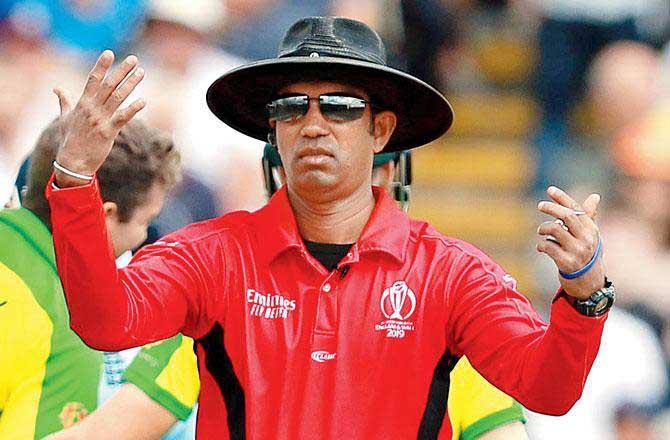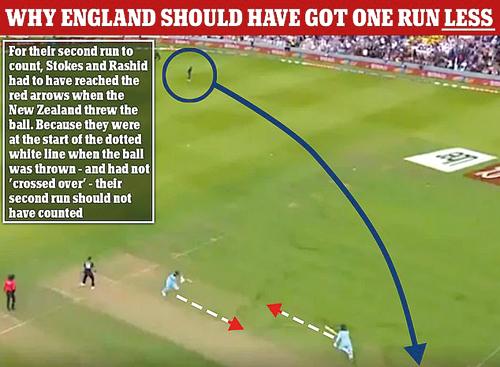22 Jul 2019 - {{hitsCtrl.values.hits}}

By Champika Fernando
When umpire Kumar Dharmasena signalled six runs off the fourth ball in England’s last over of their World Cup final run chase, there ensued a raging controversy over the validity of his call. This week, Dharmasena defended his decision but admitted the umpires had made a “judgmental error” at that moment.
“It’s easy for people to comment after seeing TV replays,” Dharmasena told the Sunday Times.
“I agree that there was a judgment al error when I see it on TV replays now. But we did not have the luxury of TV replays at the ground and I will never regret the decision I made. Beside the ICC praised me for the decision I made at that time.”
The winner of the World Cup final between England and New Zealand was finally decided on the number of boundaries hit after scores were tied at the regulation time and the Super Over. But questions were later raised whether the umpires made an error of judgment by awarding one run too many during the final over of England’s innings.
The incident happened in the fourth ball of the final over when a throw from deep midwicket accidentally ricocheted off the bat of a diving Ben Stokes at the striker’s end and raced away to the third man boundary.
Dharmasena, who was standing as head umpire, consulted with Marais Erasmus, the leg umpire, and the rest of the umpires and match referee. He decided to award six runs–two scored by Stokes and four for the overthrows. Chasing 242 for victory, England needed nine from the final three balls. This changed to three off two balls with the six runs awarded.
Dharmasena, a former World Cup winning cricketer, said that there was no provision in the law to refer this to the third umpire as maintained by some.
“There is no provision in the law to refer this to the third umpire as no dismissal was involved,” he said.
“So, I did consult the leg umpire through the communication system which is heard by all other umpires and the match referee. And, while they cannot check TV replays, they all confirmed that the batsmen have completed the run. This is when I made my decision.”
A day after New Zealand was denied a victory, a former leading umpire Simon Taufel confirmed that England should only have been awarded five runs, not six, but stressed it would be unfair to suggest the umpiring error cost New Zealand the trophy in one of the most remarkable cricket matches ever played.
“If the boundary results from an overthrow or from the wilful act of a fielder, the runs scored shall be any runs for penalties awarded to either side, and the allowance for the boundary, and the runs completed by the batsmen, together with the run in progress if they had already crossed at the instant of the throw or act,” the law 19.8 pertaining to an overthrow or willful act of fielder says.
The replays, however, showed that Stokes and non-striker Adil Rashid hadn’t crossed at the time of the throw.
“One must understand that there were too many things on our plate,” Dharmasena said.
“We had to watch the batsmen complete the first run, the ball being fielded, how it was handled by the fielder and whether the batsmen completed the second run. And where the throw would come from, the striker’s end or non-striker’s end. In this case, we were all happy that the batsmen had completed the second run because the ball ricocheted off Stokes’s bat at the time of him completing the second run. So, we assumed that they had crossed each other at the time of fielder releasing the ball.”
“These are things that happens in a cricket field,” he explained.
“For instance, an umpire can call a wide or a no-ball wrongly and just because the TV replays shows otherwise, we cannot go back and reverse the match. This is one such incident.”

When reporters questioned New Zealand Head Coach Gary Stead over the issue, he wasn’t critical about the umpires as he said it was a human error.
“It’s just the human aspect of sports and probably why we all care about it so much as well. We can’t change that now. It will go down in history as one that got away from us,” Stead was quoted as saying.
Even though overthrows from a fielder need to be penalized by adding runs to the batting side, many believe the law should be changed when it comes to ricocheting off the batsmen. This was suggested to the MCC, the makers of laws, few years ago but received no response.
“Had they done it, none of this would have happened,” a source familiar with cricket laws pointed out.
09 Jan 2025 41 minute ago
09 Jan 2025 3 hours ago
09 Jan 2025 3 hours ago
09 Jan 2025 4 hours ago
09 Jan 2025 4 hours ago